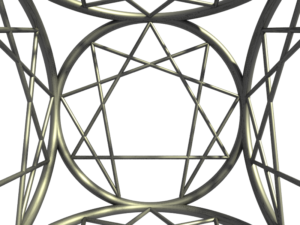The Enneagram personality test is an exciting tool that offers clients the amazing potential for tremendous self-growth.
What is an Enneagram Personality Test?
It’s an ancient personality typing system that has been used for centuries, especially by spiritual leaders desiring to strengthen their personal growth. It is also used by therapists as a clinical guide and tool.

In the past, the Enneagram model of human personalities has been a well-guarded tool and has not been shared widely with the public. Over time, however, it has moved from its exclusive privatized domain to being available to everyday people. The personality typing system helps make it possible for clients to get a good, clear look at themselves.
Ironically, the English word “personality” stems from the Latin root “persona,” meaning “mask.” In many ways it is true that people learn, early in life, to wear a mask to hide their true personalities and feelings. The mask people wear can often be a defense against pain or a way to blend into the surrounding world to lessen the risk of getting hurt. Santa Monica Christian Counseling helps individuals uncover their true selves and heal from the pain that leads to wearing such masks.
Any action repeated long enough becomes a habit, something people do without thinking. When people become accustomed to to acting and reacting in certain ways, habits form. Then, habits become embedded so deeply in the human mind that they start to be perceived as someone’s personality. Underneath these habits, however, is the true person.
One’s true self tends to be less driven and guarded than one’s persona. The true self is more at peace than the “masked” self. The Enneagram is used to untangle those patterns of habit with the hope of better understanding who your true self really is, with your guard down, exposing your true views of life. When a person discovers his or her genuine self, one is finally able to begin moving forward toward true personal growth.
Nine personality types make up the Enneagram, each one representing a characteristic of the nature of God. Because God is perfectly good, there are consequently no bad or negative Enneagram types. The purpose of the Enneagram is to gain valuable and useful knowledge that has to do with oneself. The thought behind the technique is that what people don’t know can actually hurt them; but the more people learn about themselves, the more in touch they can become.
When people live their lives on autopilot, they’ll keep doing the things that confuse and hurt themselves and others around them. In time, people get so used to making identical mistakes time and time again that they can become complacent. It is never too late, however, to wake up from the slumber of complacency. Life is too short and too precious to remain stagnant.
The Awakening
“Besides this you know the time, that the hour has come for you to wake from sleep. For salvation is nearer to people now than when they first believed.” — Romans 13:11 ESV
John Calvin said that unless you know yourself, you cannot know God.
 The majority of people have the tendency to live their lives assuming other people share their views of the world. They usually don’t question those views or even consider the forces or circumstances that actually created those views in the first place.
The majority of people have the tendency to live their lives assuming other people share their views of the world. They usually don’t question those views or even consider the forces or circumstances that actually created those views in the first place.
But their life experiences, such as the experiences of their childhood and family, have a strong influence on the way they see the world. If they take a step back, they will begin to understand how their views were formed; and it is then that they can begin to wake up.
At birth, each person came into the world without tarnish. Growing up in his or her original family setting, people began experiencing things like pain and disappointment. The reason for this is that all families are broken in some manner. No family is perfect perfect.
In an attempt to defend and protect themselves from the pain, people come up with ways to manage pain. Throughout time, these behaviors became habits, and habits become patterns. The patterns are ingrained so deeply that they became a person’s mask or personality. But this mask is not someone’s true self. It is through counseling and techniques such as the Enneagram that people can embark upon the journey of discovering their genuine, true selves.
Zen masters teach that people’s true selves are who they are and what they were like before they were even born, which is what God sees in us. They also say that people’s true being cannot be changed through things like religion, group affiliation, morality, any technique, etc.
Exploring Enneagram Types
The nine personality types in the Enneagram can be found in three triad groups (instinctual centers):
- The “instinctual” or “gut” triad contains types 1, 8, and 9. The predominate emotion here is one of anger.
- The “feelings” or “heart” triad contains types 4, 2, and 3, with shame as the primary emotion.
- The “thinking” or “head” triad contains types 5, 7, and 6, the main emotion being one of fear.
Discerning your type can begin in a number of different ways. Some personality tests can be found online, but the quality of these tests vary. No Enneagram test is completely definitive, but any test is a good place to start. Working alongside a therapist is ideal for many reasons. One who is well-versed in the Enneagram technique can assist you in truly progressing with your awakening and self-discovery.
A lot of people find that once they discover their personality type, it can be uncomfortable. Change and self-discovery are often a bit scary. A counselor who is skilled in this area can help clients work through the discomfort and pain of such a process, while helping them meet the challenges that await them, ensuring a victorious result.
Nine Enneagram Types
Below is a compiled list of the Enneagram personality types and how they relate to an aspect of the nature of God:
- Type 1, Perfectionist, reflective of God’s righteousness and goodness.
- Type 2, Helper, reflective of God’s nurture and love.
- Type 3, Achiever, reflective of God’s radiance and hope.
- Type 4, Romantic, reflective of God’s depth and creativity.
- Type 5, Observer, reflective of God’s truth and wisdom.
- Type 6, Loyalist, reflective of God’s courage and faithfulness.
- Type 7, Enthusiast, reflective of God’s abundance and joy.
- Type 8, Challenger, reflective of God’s protection and power.
- Type 9, Peacemaker, reflective of God’s oneness and peace.
I Know What Type I Am– Now What?
 Discovering your personality type is invaluable, but this is just a start. Simply knowing won’t bring transformation although awareness is vital.
Discovering your personality type is invaluable, but this is just a start. Simply knowing won’t bring transformation although awareness is vital.
When one begins to pinpoint one’s tendencies and patterns, he or she will also start to know how to self-observe throughout day to day activities. One will begin to notice the areas their attention tends to focus on naturally. The different personality types have different areas of focus and different ways of focusing.
Let’s take a look:
- Type 1 tends to focus on areas of improvement and problem-solving solutions.
- Type 2 hones in on the needs of other people so they can gain approval.
- Type 3 sees tasks that need to be accomplished so they can receive recognition and praise.
- Type 4 finds missing things.
- Type 5 tends to observe their surroundings in a detached way so that they can keep their privacy and maintain boundaries.
- Type 6 contemplates things that might go wrong.
- Type 7 gravitates toward stimulation and fun.
- Type 8 tends to take control of situations in order to keep from being vulnerable.
- Type 9 tends to look out for the needs and wants of others in order to maintain peace.
Discovering Yourself
The Enneagram can help people transform into the who God created them to be; they need only to decide to allow the change. God is the ultimate transformer. He uses tools to help people reach his perfect transformation. Being connected closely to Him will make all the difference in the world when people are open to changing and being transformed.
A quiet and still path can emerge when people use the Enneagram in their journey to transformation.
As mentioned previously, the kinds of personality types, are categorized into three particular triads. Each one has a certain version of quietness that helps its transformation process:
Stillness
 Within the instinctual triad, a crucial transformative practice is stillness. It is when individuals in this particular triad are actually forced to stop exerting power and be still that they can start to see their true selves.
Within the instinctual triad, a crucial transformative practice is stillness. It is when individuals in this particular triad are actually forced to stop exerting power and be still that they can start to see their true selves.
Solitude
Within the heart/feeling triad the practice of solitude is critical. This occurs when people let go of unhealthy aspects of their personalities concerning the people around them.
Silence
In the thinking/head triad, the key is silence. Since people of this type have a lot of thoughts and their minds are busy, silence sets the scene for peace, which promotes the ability to hear God’s voice. This is, of course, the key to true transformation.
As you start to discover your various ways of perceiving and viewing the world, and to do so without self-judgement, there will be a clarity and new understanding of how you can listen and care about the viewpoints of other people. Gaining passion for others and for yourself can then occur. Relationships are a huge part of being human; so, when relationships improve, so can your life in general.
As you start to experience others around you in the way you truly were designed to be, you’ll have a deeper appreciation for them. You’ll suddenly be able to walk in their shoes. Your relationships will improve tremendously. The Enneagram is great for couples in counseling for this very reason. It is also very beneficial to relationships with family, friends, at the workplace, in church, and in every other domain.
In Ephesians 4:22-24 people are taught to put away the things of their former lives and make themselves like God created them to be. That is the beauty and the value of the Enneagram; it is a tool to help people achieve what God desires for their lives.
How the Enneagram Helps
Why should anyone care what the Enneagram has to offer? Aren’t there plenty of personality typing techniques that exist already? The wonderful thing about the Enneagram is that people can not only learn more about the self they’ve created over time, but it can also be a guide to finding the genuine self that has been inside since birth.
Would you enjoy learning more about your individual pattern of doing life? Does becoming more familiar with the way you view life sound like it might be a positive step? You can learn about your patterns and how to transform with help from a counselor who is skilled in this area. This type of growth takes time but it is well worth the effort.
As people begin the process of untangling their feelings, thoughts and the actions behind, they can begin to really observe themselves. It is then that they can start to loosen the vice they feel they are in and let go of things that are personality imposters, allowing their true selves to break through.
Steps to Take Next
If you find you have an interest in taking some initial steps in your journey with the Enneagram, please contact your center. A counselor who is passionate and skilled in using the Enneagram would love to walk alongside you on the road of transformation. Reach out to Santa Monica Christian Counseling today and experience the best, most productive wake-up call of your life.


